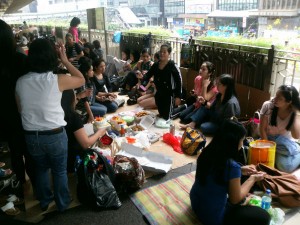
Filipino domestic helpers in Hong Kong who are stricken with cancer try to hold on to their jobs especially since the city has a socialized healthcare system, and medical treatment, like chemotherapy, is relatively cheaper there compared to that in Manila. Photo by Don Lejano/INQUIRER.net
Diagnosed with Stage 4 breast cancer, domestic helper Nida Ampaguey is coming home Tuesday to an uncertain future after her employer in Hong Kong terminated her employment.
And the only assistance she has obtained so far from the Overseas Workers Welfare Administration (Owwa) is an ambulance ride from the airport in Manila to her home in Baguio City.
Activist priest Fr. Robert Reyes, who is helping Ampaguey, said Congress should allow Owwa to provide health coverage and financial assistance to overseas Filipino workers (OFWs) who suffer from chronic diseases, like cancer.
At Stage 4, the cancer has already spread beyond the breast and already affects other organs, such as the lungs, liver or brain.
Under present Owwa rules, the agency is allowed to help only OFWs who lose their limbs or the relatives of those who die while working abroad, Reyes said.
“If you have a limb amputated, you get P50,000. If you die, your family gets P200,000. But what about those who get diagnosed with chronic diseases, like cancer?” Reyes said in an interview.
“We should have legislation for this because this is becoming critical for our OFWs. We are getting reports of OFWs having this problem not just from Hong Kong but also from other countries around the world,” he added.
PhilHealth in charge
In a text message from Jakarta, Owwa Administrator Carmelita Dimzon confirmed that the agency would be providing an ambulance for Ampaguey but that its assistance could not go further because OFWs with chronic diseases were not covered by Owwa.
“It is PhilHealth that is in charge of the health concerns of OFWs,” Dimzon said.
Reyes said he was working with Senator Pia Cayetano and cancer support groups in the country to come up with legislation to provide a program or assistance to OFWs with chronic diseases like cancer.
Help to the very end
Reyes, who started in 2007 the support group Buhay Ka for cancer victims and survivors among the thousands of Filipino domestic helpers in Hong Kong, said “more than 10 Filipino domestic helpers have come home to die” from the former British colony in recent years.
“They’re lucky if their employer supports them—we’ve had cases of Hong Kong employers helping until the very end—but others terminate their domestic helpers even if it’s still Stage 1 or Stage 2 cancer, which is still curable,” Reyes said.
Treatment is finished
Filipino domestic helpers in Hong Kong who are stricken with cancer try to hold on to their jobs especially since the city has a socialized healthcare system, and medical treatment, like chemotherapy, is relatively cheaper there compared to that in Manila.
“Ampaguey fought so hard to stay in Hong Kong for her cancer treatment but her employer terminated her. She is now very weak,” Reyes said.
“She was able to stay longer in Hong Kong because our consulate asked the authorities there to allow her to continue with her treatment. But now that that’s finished, she’s coming home to an uncertain future,” he said.
Mammogram
Reyes said the government should also require Filipino women who intend to work abroad to get a mammogram before they are deployed abroad.
“This should be done because breast cancer is becoming a big problem among our domestic helpers. But more importantly, our government should have a program for those who are diagnosed with cancer,” he said. With a report from Inquirer Research

